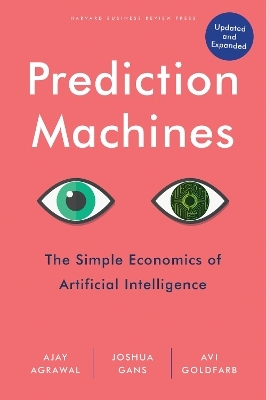
Prediction Machines
Harvard Business Review Press (Verlag)
978-1-64782-467-9 (ISBN)
- Lieferbar (Termin unbekannt)
- Versandkostenfrei innerhalb Deutschlands
- Auch auf Rechnung
- Verfügbarkeit in der Filiale vor Ort prüfen
- Artikel merken
The impact AI will have is profound, but the economic framework for understanding it is surprisingly simple.
Artificial intelligence seems to do the impossible, magically bringing machines to life—driving cars, trading stocks, and teaching children. But facing the sea change that AI brings can be paralyzing. How should companies set strategies, governments design policies, and people plan their lives for a world so different from what we know? In the face of such uncertainty, many either cower in fear or predict an impossibly sunny future.
But in Prediction Machines, three eminent economists recast the rise of AI as a drop in the cost of prediction. With this masterful stroke, they lift the curtain on the AI-is-magic hype and provide economic clarity about the AI revolution as well as a basis for action by executives, policy makers, investors, and entrepreneurs.
In this new, updated edition, the authors illustrate how, when AI is framed as cheap prediction, its extraordinary potential becomes clear:
Prediction is at the heart of making decisions amid uncertainty. Our businesses and personal lives are riddled with such decisions.
Prediction tools increase productivity—operating machines, handling documents, communicating with customers.
Uncertainty constrains strategy. Better prediction creates opportunities for new business strategies to compete.
The authors reset the context, describing the striking impact the book has had and how its argument and its implications are playing out in the real world. And in new material, they explain how prediction fits into decision-making processes and how foundational technologies such as quantum computing will impact business choices.
Penetrating, insightful, and practical, Prediction Machines will help you navigate the changes on the horizon.
Ajay Agrawal is Professor of Strategic Management and the Geoffrey Taber Chair in Entrepreneurship and Innovation at the University of Toronto's Rotman School of Management. He is founder of the Creative Destruction Lab and the Metaverse Mind Lab and cofounder of NEXT Canada and Sanctuary. Joshua Gans is the Jeffrey S. Skoll Chair of Technical Innovation and Entrepreneurship and Professor of Strategic Management at Toronto's Rotman School of Management. He is Chief Economist of the Creative Destruction Lab, department editor (Strategy) at Management Science, and cofounder and managing director of Core Economic Research. Avi Goldfarb is the Rotman Chair in Artificial Intelligence and Healthcare and Professor of Marketing at Toronto's Rotman School of Management. He is also Chief Data Scientist at the Creative Destruction Lab, a fellow at Behavioral Economics in Action at Rotman, and a faculty affiliate at the Vector Institute for Artificial Intelligence.
| Erscheinungsdatum | 20.10.2022 |
|---|---|
| Zusatzinfo | Illustrations |
| Sprache | englisch |
| Maße | 155 x 234 mm |
| Themenwelt | Informatik ► Theorie / Studium ► Künstliche Intelligenz / Robotik |
| Wirtschaft ► Betriebswirtschaft / Management ► Unternehmensführung / Management | |
| Wirtschaft ► Betriebswirtschaft / Management ► Wirtschaftsinformatik | |
| ISBN-10 | 1-64782-467-2 / 1647824672 |
| ISBN-13 | 978-1-64782-467-9 / 9781647824679 |
| Zustand | Neuware |
| Informationen gemäß Produktsicherheitsverordnung (GPSR) | |
| Haben Sie eine Frage zum Produkt? |
aus dem Bereich


